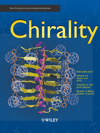
CHIRALITY
Scope & Guideline
Navigating the Complexities of Chirality in Modern Science
Introduction
Aims and Scopes
- Chiral Separation Techniques:
The journal extensively covers methodologies for the separation and analysis of chiral compounds, particularly using techniques such as high-performance liquid chromatography (HPLC), supercritical fluid chromatography (SFC), and capillary electrophoresis. - Chiroptical Properties:
Research on chiroptical phenomena, including circular dichroism and optical rotation, is a significant focus. This includes studies on the interaction of light with chiral materials and the development of new chiroptical measurement techniques. - Synthesis of Chiral Compounds:
The synthesis and characterization of new chiral molecules, including asymmetric synthesis, biocatalysis, and novel chiral ligands, is a core area of interest, with implications for drug development and materials science. - Biological Applications of Chirality:
The journal highlights the biological significance of chirality, including studies on chiral drugs, their pharmacokinetics, and interactions with biological receptors. - Theoretical and Computational Studies:
Theoretical approaches to understanding chirality, including molecular modeling and computational chemistry, are featured, providing insights into chiral interactions and properties.
Trending and Emerging
- Sustainable and Green Chemistry:
There is a growing emphasis on sustainable practices in chiral synthesis, including biocatalysis and environmentally friendly solvents, aligning with global trends in green chemistry. - Nanotechnology and Chirality:
Research integrating nanotechnology with chirality is on the rise, exploring the applications of chiral nanomaterials in drug delivery, sensors, and photonic devices. - Chirality in Material Science:
Emerging studies are increasingly focusing on the role of chirality in the properties of materials, particularly in the development of chiral polymers and photonic materials. - Multidisciplinary Approaches to Chirality:
There is a trend towards interdisciplinary research that combines insights from chemistry, biology, physics, and materials science to explore complex chiral systems. - Advanced Chiroptical Techniques:
Recent publications show an increased interest in innovative chiroptical measurement techniques, including time-resolved spectroscopy and the use of synchrotron radiation.
Declining or Waning
- Traditional Chiral Analysis Methods:
There has been a noticeable decline in the publication of studies focused solely on traditional methods of chiral analysis, such as basic chromatographic techniques without novel enhancements or applications. - Generalized Chiral Theory Discussions:
Papers that provide broad theoretical discussions on chirality without specific applications or experimental data have decreased in frequency, indicating a shift towards more applied research. - Chirality in Inorganic Chemistry:
Research specifically focused on chirality in inorganic compounds appears to be waning, as the journal increasingly emphasizes organic and biological applications of chirality. - Chiral Drug Development Focused on Older Compounds:
The focus on the development and analysis of older chiral drugs is decreasing, likely due to the pharmaceutical industry's shift towards novel compounds and innovative therapeutic strategies.
Similar Journals

Macroheterocycles
Fostering Global Collaboration in Chemistry DiscoveriesMacroheterocycles is a premier academic journal dedicated to the exploration and advancement of Analytical Chemistry and Organic Chemistry, published by the esteemed Ivanovo State University of Chemical Technology. Since its inception in 2008, this open-access journal has focused on providing a platform for innovative research and breakthrough discoveries in the field of heterocyclic compounds. With its current ranking in the Q3 quartile for Analytical Chemistry and Q4 quartile for Organic Chemistry, Macroheterocycles is rapidly establishing itself as a valuable resource for scientists, researchers, and students seeking to enrich their understanding of complex chemical structures and analytical techniques. Its comprehensive publication model ensures that the latest findings are accessible to a global audience, fostering collaboration and discourse in the scientific community. With ongoing contributions aimed at addressing contemporary challenges in chemistry, this journal is poised to make significant impacts in the field while encouraging the dissemination of knowledge within and beyond Russia.

BIOORGANIC & MEDICINAL CHEMISTRY LETTERS
Delivering essential knowledge in bioorganic chemistry.BIOORGANIC & MEDICINAL CHEMISTRY LETTERS, published by PERGAMON-ELSEVIER SCIENCE LTD, is a leading journal in the fields of biochemistry, drug discovery, and medicinal chemistry, designed to disseminate significant advances in these disciplines. Established in 1991, the journal spans various important categories, including Organic Chemistry and Pharmaceutical Science, with its 2023 Scimago Journal Rank placing it at Q2 in Organic Chemistry and Q3 in several other relevant fields. Though not an open-access publication, it provides invaluable insights into contemporary research and innovative methodologies, appealing to researchers, professionals, and students alike. The journal's commitment to quality and relevance makes it a vital resource for those aiming to stay at the forefront of bioorganic and medicinal chemistry developments. For more information, please visit the journal's website as it remains a critical platform for scholarly exchange, particularly for those engaged in interdisciplinary research.

REVUE ROUMAINE DE CHIMIE
Empowering Researchers to Transform Chemical KnowledgeREVUE ROUMAINE DE CHIMIE is a distinguished academic journal in the field of chemistry, published by EDITURA ACAD ROMANE in Romania. With an ISSN of 0035-3930, this journal has been a valuable platform for disseminating original research and insights in the diverse realm of chemistry since its inception. The journal currently operates under a competitive tier, categorized in Q4 for miscellaneous chemistry fields, as reflected in its Scopus ranking of #348 out of 408, placing it within the 14th percentile. Aiming to foster scientific discourse and innovation, the REVUE ROUMAINE DE CHIMIE provides a repository of knowledge that is crucial for researchers, professionals, and students eager to advance their understanding and contribute to the global chemistry community. By bridging local and international research initiatives, this journal plays an essential role in enhancing the visibility of Romanian scientific contributions on the world stage.

Heterocyclic Letters
Championing High-Quality Research in Organic ChemistryHeterocyclic Letters is an esteemed journal in the field of synthetic organic chemistry, published by RAMAN PUBL. With ISSN 2231-3087 and E-ISSN 2230-9632, this journal aims to disseminate original research and innovative findings related to heterocyclic compounds, which play a crucial role in medicinal chemistry, material science, and agricultural chemistry. Heterocyclic Letters provides a platform for researchers, professionals, and students to share their insights and advancements, thus fostering academic collaboration and knowledge transfer. The journal is dedicated to maintaining high-quality standards in research publication, making it an essential resource for anyone focused on the latest developments in heterocyclic chemistry. Although it does not currently offer Open Access options, the journal’s rigorous peer-review process ensures that only the most credible and impactful studies are published, contributing significantly to the advancement of the field.
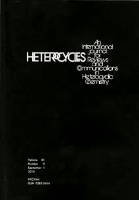
HETEROCYCLES
Bridging Gaps in Drug Discovery and DevelopmentHETEROCYCLES, published by the Japan Institute of Heterocyclic Chemistry, stands as a pivotal journal within the fields of Analytical Chemistry, Organic Chemistry, and Pharmacology. With its ISSN 0385-5414 and E-ISSN 1881-0942, HETEROCYCLES has been a respected platform for scholarly work since its establishment in 1983, featuring innovative research up until 2022. While currently not open access, the journal is renowned for its rigorous peer-review process, ensuring the dissemination of high-quality research. Despite its Q4 ranking in the 2023 quartiles for its categories, it plays a crucial role in bridging gaps in knowledge and advancing the discourse on heterocyclic compounds, which are vital in drug discovery and development. Researchers, professionals, and students who are engaged in chemistry and pharmacology will find HETEROCYCLES an essential source of cutting-edge studies, insights, and an opportunity to contribute to the evolving landscape of these scientific fields.
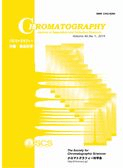
Chromatography
Pioneering techniques, bridging disciplines in chromatography.Chromatography is an esteemed journal published by the SOC CHROMATOGRAPHIC SCIENCES, dedicated to advancing the field of chromatographic techniques and their applications across various disciplines, including analytical chemistry, biochemistry, and environmental science. By facilitating the exchange of high-quality research, Chromatography plays a pivotal role in enhancing methodologies and technologies that drive innovation in sample analysis. While the journal is not currently open access, it maintains a rigorous peer-review process, ensuring the publication of valuable and impactful studies. Researchers, professionals, and students alike can benefit from its comprehensive coverage of chromatography-related advancements, making it a vital resource for anyone engaged in this dynamic area of study.

BMC Chemistry
Connecting Researchers to Transform ChemistryBMC Chemistry, published by BMC, is a reputable open access journal that has made significant strides since its inception in 2019. Operating under e-ISSN 2661-801X, this journal is dedicated to advancing the field of general chemistry by promoting high-quality research across various sub-disciplines. Headquartered in the United Kingdom, BMC Chemistry boasts a commendable impact factor and is classified in Q2 within the prestigious field of Chemistry (miscellaneous) according to the 2023 category quartiles. The journal's Scopus ranking places it at #139 out of 408 in its category, highlighting its growing relevance and influence in the academic community, with a commendable 66th percentile standing. With a commitment to open access, BMC Chemistry ensures that groundbreaking discoveries and innovative research are available to a global audience, fostering collaboration and development in chemistry. Researchers, professionals, and students alike will find this journal to be an invaluable resource for disseminating knowledge and driving scientific advancement.
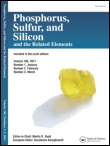
PHOSPHORUS SULFUR AND SILICON AND THE RELATED ELEMENTS
Connecting Chemistry with Real-World ApplicationsPHOSPHORUS SULFUR AND SILICON AND THE RELATED ELEMENTS, published by Taylor & Francis Ltd, is a distinguished journal dedicated to advancing knowledge in the fields of Biochemistry, Inorganic Chemistry, and Organic Chemistry. Established in 1989, the journal has carved a niche in the scientific community by offering a platform for the publication of innovative research that explores the chemistry and applications of phosphorus, sulfur, silicon, and related elements. With an ISSN of 1042-6507 and an E-ISSN of 1563-5325, this journal provides access to valuable insights, albeit without open access options. Despite being positioned in the fourth quartile of its categories (Q4), it remains an essential resource for researchers, professionals, and students seeking to expand their understanding of these pivotal elements and their interactions. With a publishing horizon extending to 2024, the journal invites contributions aimed at pushing the boundaries of chemistry and fostering interdisciplinary dialogue.
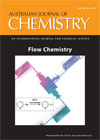
AUSTRALIAN JOURNAL OF CHEMISTRY
Advancing chemical knowledge, one article at a time.The Australian Journal of Chemistry, with an ISSN of 0004-9425 and an E-ISSN of 1445-0038, is a distinguished publication from CSIRO PUBLISHING, dedicated to advancing the field of chemistry since its inception in 1948. Based in Australia, this journal serves as a platform for original research articles, reviews, and innovative studies that encompass a wide spectrum of chemical disciplines, aiming to foster communication and collaboration among researchers globally. Despite its Q3 ranking in the Chemistry (Miscellaneous) category and standing at rank #236 in Scopus’ general chemistry classification, it remains an essential resource for professionals and students seeking to stay informed about emerging trends and discoveries in chemistry. The journal does not offer open access, emphasizing the premium quality of peer-reviewed content that adheres to rigorous academic standards. By bridging theory and practice, the Australian Journal of Chemistry continues to play a crucial role in shaping the future of chemical sciences.

LCGC EUROPE
Advancing chromatographic science for a brighter tomorrow.LCGC EUROPE is a prominent journal dedicated to the field of analytical chemistry, specifically highlighting the latest trends and innovations in chromatographic techniques. Published by MJH Life Sciences, this journal has served as a valuable resource for researchers, professionals, and students interested in the nuances of laboratory practices and the advancement of instrumentation. Although LCGC EUROPE ceased its coverage in Scopus from 2018, it has maintained a significant influence within the community, evidenced by its Scopus rank of 90/114 in Analytical Chemistry, placing it in the 21st percentile. With its inception dating back to 1996, the journal provided essential insights and peer-reviewed articles, fostering a rich understanding of chromatographic science. While the journal is not currently open access, it remains an integral part of the literature for anyone engaged in the analytical chemistry landscape, especially as it pertains to laboratory methodologies and innovations.